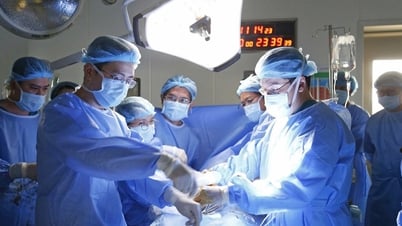Starting the day with health news , readers can also read more articles: New discovery about the best time to exercise for the elderly; 3 reasons why blood sugar increases without a clear cause ; 4 things to do after 5pm to lose weight faster...
4 signs in the feet indicate kidney damage
Many people with kidney disease only find out when the disease has progressed. One way to detect kidney problems early is to look for unusual signs in the legs.
This is because the legs are easily affected by changes in blood circulation or water retention in the body. Some abnormalities in the legs will be an early warning sign that the kidneys are damaged or have impaired function.

Kidney disease can cause electrolyte disturbances, making your legs more prone to aches and pains.
PHOTO: AI
Signs in the legs that are directly related to kidney failure include:
Swelling, edema - a common sign of kidney disease. Swelling of the legs, especially the ankles and feet, is one of the most common signs of chronic kidney disease. When the kidneys no longer filter blood effectively, sodium and fluid build up in the body, leading to edema.
Swollen legs are easily confused with venous insufficiency or heart problems. To differentiate, swelling and edema of the legs due to kidney will be accompanied by symptoms such as little urination, fatigue, and high blood pressure.
Cold feet. Consistently cold feet, even in warm weather, can be a sign of poor blood flow. This is a common consequence of kidney disease. Decreased kidney function can cause anemia by reducing production of the hormone erythropoietin, which stimulates the bone marrow to make red blood cells.
A lack of red blood cells causes the blood to carry less oxygen, leading to cold hands and feet and sensitivity to cold temperatures. This condition often occurs in people with stage 3 or later chronic kidney disease. The next content of this article will be on the health page on June 1.
3 reasons why blood sugar increases without a clear cause
It is a common belief that blood sugar levels only increase when you eat too many sweets or white starches. However, the reality is much more complicated. There are hidden, hard-to-see causes that can have a big impact on blood sugar levels.
Several factors can cause high blood sugar even when a person eats properly, takes medication, and monitors blood sugar levels carefully.

Stress can increase blood sugar despite a healthy diet
PHOTO: AI
Lesser-known causes that can cause high blood sugar levels include:
Illness or stress. When you are sick or under prolonged stress, your body releases more of the hormones cortisol and adrenaline. These are stress hormones that help your body cope with life's dangers. However, they also increase blood sugar.
According to the American Diabetes Association, when the body is infected or stressed, the liver releases glucose into the bloodstream. This natural mechanism helps to temporarily increase the body's energy supply. However, for diabetics, due to a decrease in the hormone insulin, their bodies cannot use this glucose effectively. As a result, blood sugar levels increase.
Dehydration can increase blood sugar. Water makes up about 60% of the body. Therefore, dehydration will affect many physiological functions, including blood sugar. When the body lacks water, the amount of sugar in the blood will be more concentrated, causing blood sugar to increase even if you do not eat anything else.
According to the Cleveland Clinic (USA), dehydration reduces plasma volume, causing blood glucose levels to increase. In addition, the kidneys function less effectively when dehydrated, leading to a decrease in the ability to excrete excess sugar through urine. Therefore, if a diabetic feels dry mouth, dizziness or dark urine, drink water immediately. The next content of this article will be on the health page on June 1 .
4 things to do after 5pm to lose weight faster
Losing weight is not just about dieting at breakfast or exercising at noon. In fact, the time after 5 p.m., from the time you finish work to bedtime, is just as important for weight control.
After 5pm, the body begins to enter a resting state, metabolism slows down. Unreasonable eating and living habits will easily ruin your weight loss goals.

A light walk after dinner will help you lose weight more easily.
PHOTO: AI
To optimize weight loss, after 5pm, people need to maintain the following:
Eating dinner early helps you lose weight sustainably. Eating dinner too late will negatively affect your weight loss goals. A study published in Harvard Health Publishing (USA) showed that people who ate dinner after 8 p.m. burned fewer calories, stored more fat, and felt hungrier the next day than those who ate before 6 p.m.
The reason is that after 6-7pm, the body's metabolism begins to slow down. This is a natural mechanism to prepare for sleep. If you eat too late, calories will not be consumed but will easily be stored as fat. Therefore, eating dinner before 7pm is an effective strategy for sustainable weight loss.
Balanced dinner. Not only should you eat early, dinner also needs to have a balanced nutritional composition. Specifically, dinner should have enough green vegetables, lean protein, such as chicken breast, fish, tofu, and a small amount of complex starch. Common dishes high in complex starch are brown rice, sweet potatoes, beans or oats. In particular, people who are losing weight need to limit dishes high in white starch, fat and sugar. Start your day with health news to see more of this article!
Source: https://thanhnien.vn/ngay-moi-voi-tin-tuc-suc-khoe-cach-nhan-biet-than-bi-ton-thuong-185250601000108722.htm


































































































Comment (0)